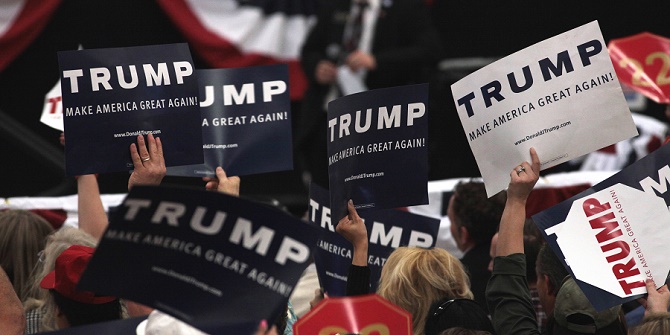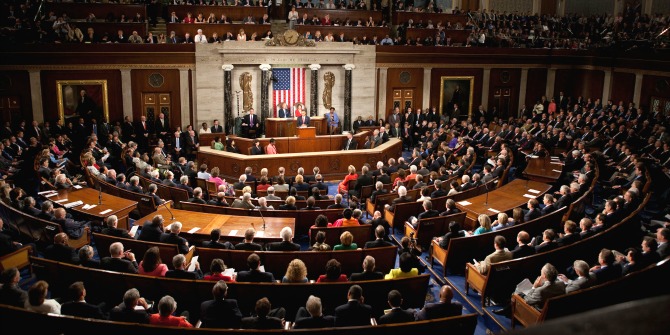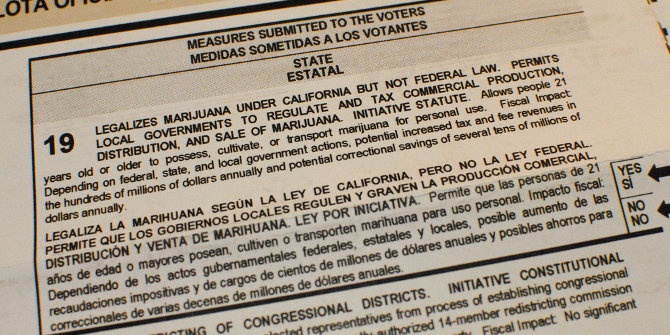 Nearly a year out from the 2024 presidential election, the contest looks almost certain to be a re-run of the 2020 election, with the incumbent Democratic president, Joe Biden facing former president, Donald Trump. One factor which could spoil the election for either candidate is the entry into the race as an independent of Robert Kennedy, Jr. Melissa Smith writes that while RFK Jr. has next to no chance of winning the White House next November, his appeal to Republican far right and Democratic far left voters, and to many young Americans, means that he may have a real chance of being a spoiler for both 2024’s re-run candidates.
Nearly a year out from the 2024 presidential election, the contest looks almost certain to be a re-run of the 2020 election, with the incumbent Democratic president, Joe Biden facing former president, Donald Trump. One factor which could spoil the election for either candidate is the entry into the race as an independent of Robert Kennedy, Jr. Melissa Smith writes that while RFK Jr. has next to no chance of winning the White House next November, his appeal to Republican far right and Democratic far left voters, and to many young Americans, means that he may have a real chance of being a spoiler for both 2024’s re-run candidates.
This should come as no surprise to anyone paying attention, but a lot of Americans are probably tuning out of politics by now. After all, the mainstream media keep reporting that the 2024 presidential election will be a re-run of 2020. Given the low approval numbers for both President Joe Biden and former president Donald Trump, that proclamation doesn’t exactly excite the masses.
Enter Robert Francis Kennedy, Jr. Better known as RFK Jr., the son of Bobby Kennedy, the nephew of President John F. Kennedy, an inner member of the esteemed Democratic clan, and the outlier of his family. He began his run for president as a Democrat but decided to become an independent candidate this past October.
Will RFK Jr. be a spoiler candidate next year?
A poll released in early November showed RFK Jr. with 22 percent in a hypothetical three-way race against Biden and Trump. There was great cheering from his supporters and wringing of hands among Democrats. Those are respectable polling numbers for an independent, but we are still almost a year out from the election, and it’s unclear if his support will hold, diminish, or grow in the coming months.
If history is a decent guide, the best he can hope for is to pull enough votes away from the other candidates to throw the election into real chaos. Those who say he can win are probably wrong. It is indescribably difficult to overcome the hold that the Democratic and Republican parties have over politics in the United States. These two parties have been around since the mid-1800s, and they have established processes by which members rise to power in state organizations. Everybody knows these two parties and everybody has friends who are members of them. Voting decisions can be hard. It’s easier to just vote straight ticket and be done.
For third-party and independent candidates in the US, there is a peculiar agony in realizing that, despite all your work, money, and speeches, you are fortunate if you are a spoiler in an election. You won’t ascend to the White House, and you will be reviled by those whose hopes you dashed.
Ralph Nader learned this in 2000, when he pulled 2.7 percent of the vote and was blamed for Al Gore’s failed presidential bid. Nader was ostracized, and some Democrats still spit when they hear his name. His crime? He might have pulled votes from Gore in Florida, a state that the former vice president lost by 537 votes.
Alabama governor George C. Wallace still stands as one of the most successful independent candidates. His 1968 independent campaign for president captured 13.5 percent of the vote. He won five Southern states and is the most recent third-party candidate to win states in the Electoral College (not counting so-called faithless electors).
Few people expect RFK Jr. to pull 20 percent in the actual election. But there is no doubt that his mix of liberal, conservative, and Libertarian views places him in that odd location where the far right of the Republican Party and the far left of the Democratic Party meet and can coalesce around this type of candidate.
Kennedy’s controversies
For instance, much of Kennedy’s financing has come from large donors who supported Trump in the past. He has received Democratic money, as well, but as soon as he announced he would run as an independent, the Republican money began to flow.

“Robert F. Kennedy Jr. Health Freedom Ral” (CC BY-NC 2.0) by pameladrew212
His stances on several issues enable him to pull from both the Republican far right and the Democratic far left. In addition to his anti-vaccine stance, which is well known and documented, he has pledged to break up the “too big to fail” banks and monopolies, vowed to end the war in Ukraine, enact policies that favor small businesses, end “forever wars,” said he believes in gun control, but won’t take people’s guns away, pledged to “increase wealth for all,” and voiced opposition to transgender athletes competing outside of the genders they were assigned at birth.
He embraces populists because he says that they distrust the government, hates Big Pharma, and spoke before the House Judiciary Committee this summer about the “weaponization of the federal government.” While testifying in D.C., he denied spreading conspiracy theories through social media and said that censorship is a major problem in the country. This came after the New York Post ran a story about Kennedy’s comments saying COVID-19 might have been genetically targeted to impact races disproportionally, impacting fewer Ashkenazi Jews and Chinese people.
Kennedy was removed from Instagram in 2021 for sharing debunked claims about the Covid-19 virus, but the ban was lifted in June 2023 when he became a presidential candidate. He seems to be enjoying greater access on social media, although censorship is a topic near and dear to his heart.
RFK Jr. was recently endorsed by several well-known athletes, including Aaron Rodgers of the NFL, former NBA great John Stockton, and former NFL player Ken Ruettgers, most of whom praise his anti-elitist stance. Stockton has been a Democratic supporter in the past, while Ruettgers was a supporter of the Republican Party. While this may not be a predictor of what will happen in 2024, it’s interesting to see support for Kennedy coming from those who have traditionally supported the established parties.
Young voters seem interested in Kennedy’s campaign. In a recent Siena/New York times poll, he was seen as outperforming Biden and Trump among young Americans in swing states, and he seems to be drawing financial support from donors who were not active in the 2020 campaign.
It’s too early to tell RFK Jr.’s real support.
So, what does all this mean? If you took a Magic 8 ball and shook it up, it would probably be about as accurate as anyone making a prediction at this point. It’s simply too far out from the general election to gauge how strong Kennedy’s support will be next fall.
In 2020, all the third-party candidates combined received a bit more than 5 percent of the votes. Many people don’t want to vote for an independent or third-party candidate because they feel they are wasting their votes. However, the unpopularity of Trump and Biden might cause them to reconsider that notion.
Kennedy has said he is running to “spoil” the 2024 presidential election, and, if his numbers hold up, he might truly have an impact on the ability of one candidate to garner the 270 electoral votes necessary to win. He might yet experience that peculiar agony of being a spoiler.
But there’s a long way to go before the general election.
- Please read our comments policy before commenting.
- Note: This article gives the views of the author, and not the position of USAPP – American Politics and Policy, nor the London School of Economics.
- Shortened URL for this post: https://bit.ly/40PbhXS






